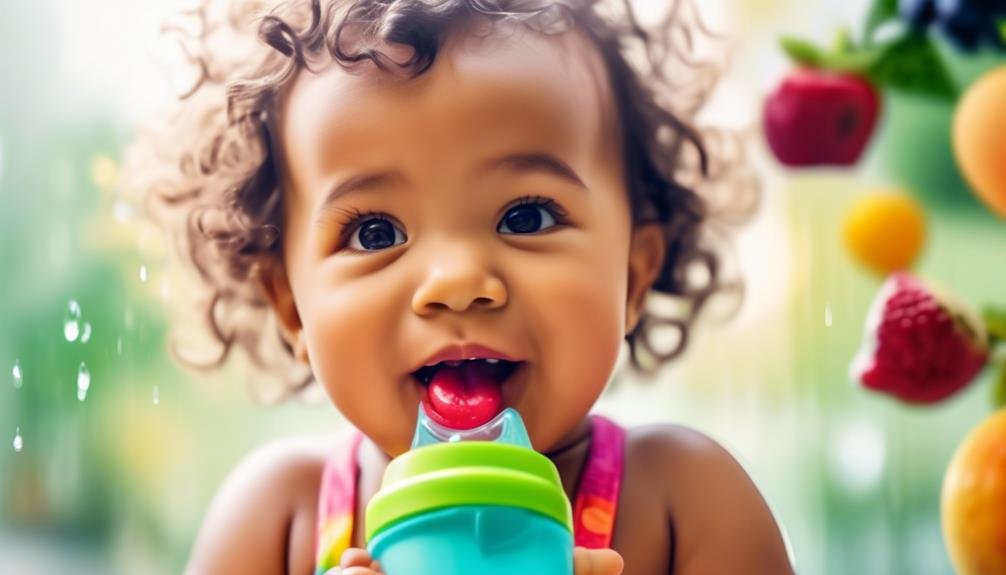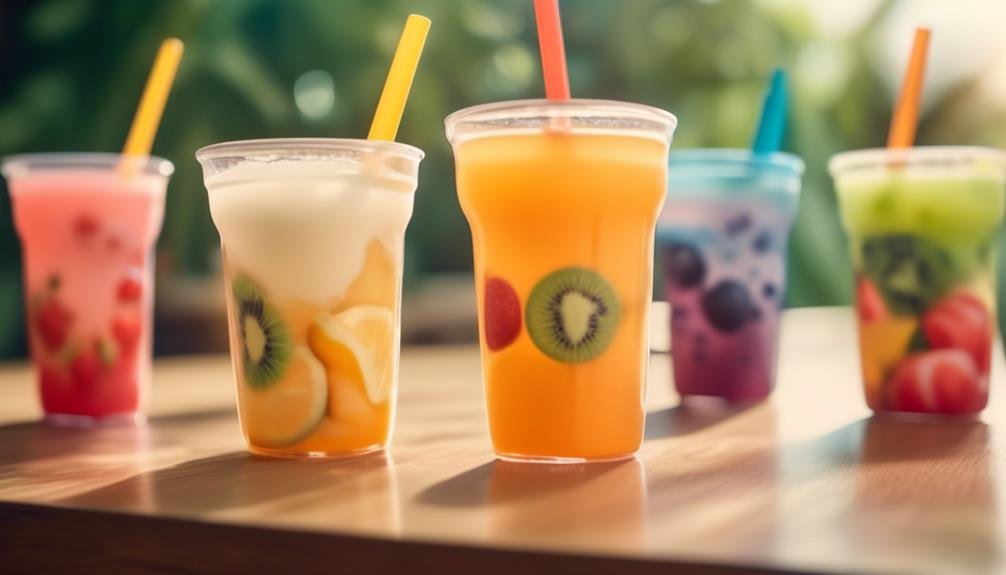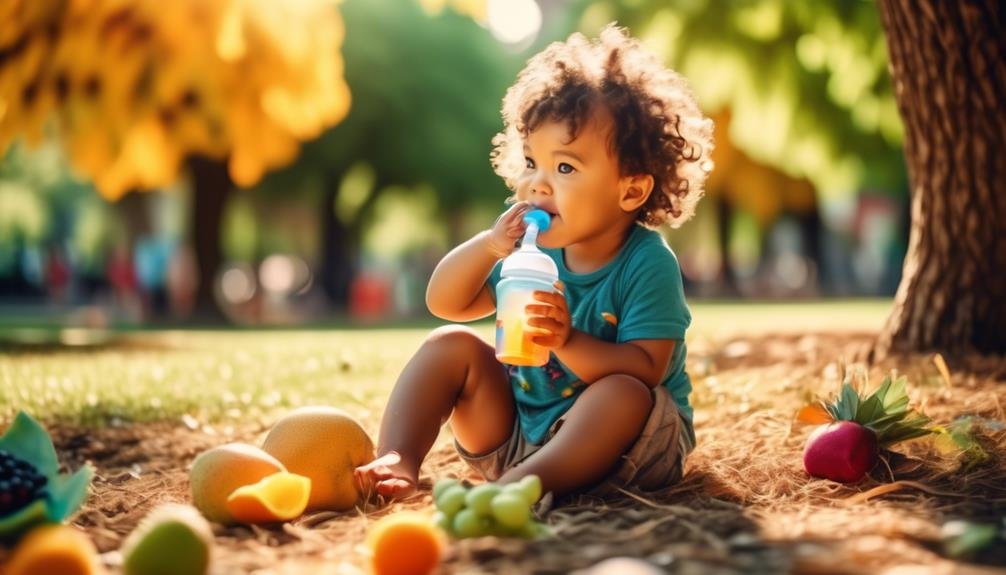"Cherishing Little Steps - A Haven for Baby and Family Journeys"
Hydration Tips for Toddlers
Imagine your toddler is a delicate flower, constantly in need of nourishment to bloom and thrive. Just as a flower needs water to grow, toddlers require proper hydration to stay healthy and active.
But how do you ensure that your little one is drinking enough fluids throughout the day? In this discussion, we will explore some effective and practical hydration tips specifically tailored for toddlers.
So, let's embark on this journey together and discover the secrets to keeping your toddler hydrated and happy.
Key Takeaways
- Staying hydrated is crucial for toddlers to thrive and stay healthy.
- Daily fluid intake for toddlers is 4-5 cups of fluid per day.
- Water is the best choice to keep toddlers hydrated.
- Creative ways to encourage drinking include fun water games and DIY flavored water recipes.
Importance of Hydration

Staying hydrated is crucial for toddlers to thrive and stay healthy. As a parent, you already know the importance of providing a balanced diet for your little one. But did you know that water intake is just as important? Ensuring that your toddler stays hydrated offers numerous benefits that contribute to their overall well-being.
One of the key benefits of staying hydrated is maintaining proper bodily functions. Water plays a vital role in regulating body temperature, aiding digestion, and transporting nutrients throughout the body. It also helps to flush out toxins and waste products, keeping your toddler's system clean and healthy.
Proper hydration also supports brain function and cognitive development. Studies have shown that dehydration can negatively impact attention, memory, and overall cognitive performance in children. By encouraging your toddler to drink enough water, you can help them stay focused, alert, and ready to learn and explore their world.
Furthermore, staying hydrated promotes healthy skin and prevents constipation. Water helps to keep the skin moisturized and supple, preventing dryness and irritation. It also softens stool, making it easier for your toddler to have regular bowel movements.
Recommended Fluid Intake for Toddlers
Now let's dive into the important topic of how much fluid your toddler should be drinking each day to stay properly hydrated. Proper hydration is crucial for your toddler's overall health and well-being. It not only helps regulate body temperature and maintain bodily functions but also plays a vital role in their cognitive development. Ensuring that your little one gets enough fluids throughout the day is essential for their growth and development.
So, how much fluid should your toddler be drinking? The table below provides a general guideline for recommended fluid intake based on age:
| Age Group | Daily Fluid Intake |
|---|---|
| 1-3 years | 4-5 cups |
| 4-8 years | 5-7 cups |
| 9-13 years | 7-9 cups |
Remember, these are just rough estimates, and individual needs may vary. It's important to keep in mind that fluid intake includes not only water but also other beverages and even the water content in food.
Keeping your toddler hydrated is key to their cognitive development. Studies have shown that dehydration can negatively affect cognitive function, attention, and memory in children. By ensuring your toddler gets enough fluids, you can support their cognitive growth and help them reach their full potential.
In the next section, we will explore some practical tips on how to encourage your toddler to drink enough fluids throughout the day.
Choosing the Right Beverages

What are the best beverage choices to keep your toddler hydrated and healthy?
It's important to choose the right beverages for your little one, as hydration plays a crucial role in their overall health and well-being. Here are some healthy alternatives to consider for your toddler:
- Water: This is the best choice to keep your toddler hydrated. It's pure, calorie-free, and doesn't contain any added sugars or artificial flavors. Encourage your child to drink water throughout the day, especially during meals and physical activities.
- Milk: Milk is another great option for toddlers, as it provides essential nutrients like calcium and vitamin D. Choose whole milk for children under the age of 2, and switch to low-fat milk after that. Avoid flavored milk, as it often contains added sugars.
- Fresh fruit juices: While fruit juices can be a good source of vitamins, it's important to limit their intake. Opt for freshly squeezed juices without any added sugars, and dilute them with water to reduce their natural sugar content.
- Herbal teas: Herbal teas, such as chamomile or peppermint, can be a hydrating and soothing option for your toddler. Make sure to choose caffeine-free options and avoid adding honey or sweeteners.
Remember to be mindful of hydration myths, such as the belief that sports drinks are necessary for toddlers. Stick to these healthy alternatives to ensure your little one stays hydrated and healthy.
Creative Ways to Encourage Drinking
To make drinking more enjoyable for your toddler, try incorporating creative and interactive methods into their daily routine.
Fun water games can be a great way to encourage your little one to drink more fluids. One popular game is the 'Sponge Relay,' where you and your toddler take turns soaking up water with a sponge and squeezing it into a bucket. You can also try the 'Water Balloon Toss,' where you fill up water balloons and toss them back and forth without letting them burst. These games not only make drinking more fun, but they also keep your toddler engaged and entertained.
Another way to make drinking more exciting is by creating DIY flavored water recipes. You can infuse water with slices of fruits like strawberries, oranges, or cucumbers to add a burst of flavor. Let your toddler help you make their own special drink by choosing their favorite fruits and adding them to a pitcher of water. You can also freeze fruit slices or berries in ice cube trays and drop them into their water cup for a refreshing twist.
Hydration Tips for Picky Eaters

For picky eaters, finding ways to keep them hydrated can be a challenge. These little ones often struggle with the tastes and textures of different foods, making it difficult to introduce new flavors, including those found in beverages. However, there are strategies you can try to ensure your picky eater stays properly hydrated.
- Get creative with water: Plain water may not appeal to your picky eater, so try infusing it with fruits like berries or citrus slices to add a hint of flavor without added sugars or artificial sweeteners.
- Offer smoothies: Smoothies are a great way to sneak in fruits and vegetables while keeping your child hydrated. Experiment with different combinations and find one that your picky eater enjoys.
- Make popsicles: Freeze pureed fruits or yogurt into popsicle molds for a fun and refreshing treat. Not only will this help keep your child hydrated, but it can also be an opportunity to introduce new flavors in a more appealing way.
- Try flavored water alternatives: If your picky eater refuses plain water, consider offering flavored water alternatives that are low in sugar and additives. Look for options made with natural flavors and no artificial colors.
Signs of Dehydration in Toddlers
If your picky eater isn't properly hydrated, it's important to be aware of the signs of dehydration in toddlers. Dehydration can occur when your child's body doesn't have enough fluids to function properly. It can happen for various reasons, such as not drinking enough fluids or excessive sweating from vigorous play. Recognizing the signs of dehydration is crucial in preventing further complications.
One of the earliest signs of dehydration in toddlers is dry mouth and lips. You may notice that your child isn't producing as much saliva as usual, making their mouth feel sticky or dry. Additionally, a decrease in urine output is another indicator. If you notice that your toddler hasn't had a wet diaper in three or more hours, it might be a sign of dehydration.
Other signs to watch out for include dark yellow urine, sunken eyes, lethargy, irritability, and a decrease in tears when crying. If your child exhibits any of these symptoms, it's important to take immediate action.
To prevent dehydration, make sure your toddler drinks plenty of fluids throughout the day. Offer water, milk, or diluted fruit juices regularly. You can also include foods with high water content, such as watermelon or cucumbers, in their diet. Encourage your child to drink fluids before, during, and after physical activities.
Tips for Hydrating During Outdoor Activities

Staying hydrated during outdoor activities is crucial for your toddler's health and safety. As they run around and explore, it's important to make sure they're getting enough fluids to keep their little bodies functioning properly.
Here are some tips to help you keep your toddler hydrated during outdoor adventures:
- Pack a hydration pack: Using a hydration pack can be a game-changer when it comes to keeping your toddler hydrated. These packs are designed to hold water, making it easy for your little one to take sips whenever they need. Plus, they come in fun designs that your toddler will love.
- Offer electrolyte-rich drinks: Electrolytes play a vital role in maintaining fluid balance in the body. To ensure your toddler stays hydrated and maintains electrolyte balance, offer them drinks like coconut water or diluted fruit juice. These options provide essential nutrients and electrolytes to keep your toddler energized.
- Set regular drinking intervals: Toddlers can easily get caught up in their activities and forget to drink. Set regular intervals, like every 30 minutes, for them to take a break and have a drink. This will help prevent dehydration and keep them hydrated throughout the day.
- Encourage water breaks during play: If your toddler is engaged in active play, encourage them to take water breaks. This won't only keep them hydrated but also teach them the importance of staying hydrated during physical activities.
Tips for Hydrating at Night
To ensure your toddler stays hydrated throughout the night, here are some practical tips you can follow.
Bedtime can be a challenging time to keep your little one hydrated, especially when they're fast asleep. However, preventing nighttime dehydration is crucial for their well-being.
First, make sure your toddler drinks plenty of fluids during the day. Encourage them to have regular sips of water or diluted fruit juices. This will help maintain their hydration levels before bedtime.
Next, consider offering a small drink before tucking them in for the night. A few sips of water or a glass of milk can go a long way in preventing dehydration. Just be mindful not to give them too much, as this might lead to frequent trips to the bathroom and disturb their sleep.
Another tip is to keep a sippy cup or water bottle within your toddler's reach. This way, if they wake up thirsty during the night, they can easily help themselves to a drink without waking you up.
Lastly, ensure the room temperature is comfortable and not too hot or dry. This will help prevent excessive sweating and fluid loss, reducing the risk of dehydration.
Frequently Asked Questions
What Are Some Common Signs of Dehydration in Toddlers?
Feeling thirsty, dry mouth, and dark-colored urine are some signs of dehydration in toddlers. It's important to keep them hydrated to prevent these symptoms. Make sure they drink enough fluids throughout the day.
How Much Water Should a Toddler Drink if They Are Not Thirsty?
If you're wondering how much water a toddler should drink if they're not thirsty, it's important to focus on hydration tips. Incorporating fruits and veggies into their diet and encouraging water even when not thirsty can help keep them hydrated.
Are Sports Drinks a Good Option for Toddlers to Stay Hydrated?
Sports drinks may seem like a good option for toddlers to stay hydrated, but they're not. Instead, opt for healthier alternatives like water or diluted fruit juice. These options provide the necessary hydration without added sugars or artificial ingredients.
Can Toddlers Drink Too Much Water?
You may think that toddlers can never drink too much water, but it's important to be cautious. Water intoxication is a real risk, especially for little ones with certain medical conditions. Monitoring their intake is crucial.
What Are Some Strategies to Prevent Dehydration During Hot Weather?
To keep your little one hydrated in the hot weather, it's important to make sure they drink enough water. Encourage them to sip water throughout the day and offer juicy fruits as a tasty way to stay hydrated.
Conclusion
So there you have it, some practical tips to ensure your toddler stays hydrated throughout the day.
Remember, hydration is essential for their overall health and well-being.
By following these tips and getting creative with their drinks, you can make sure they're getting enough fluids, even if they're picky eaters.
Keep an eye out for signs of dehydration, especially during outdoor activities, and make sure to offer plenty of fluids before bedtime.
Stay hydrated and keep your little one happy and healthy!


